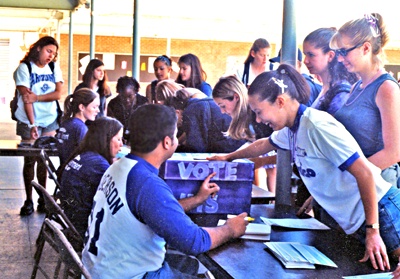All Nonfiction
- Bullying
- Books
- Academic
- Author Interviews
- Celebrity interviews
- College Articles
- College Essays
- Educator of the Year
- Heroes
- Interviews
- Memoir
- Personal Experience
- Sports
- Travel & Culture
All Opinions
- Bullying
- Current Events / Politics
- Discrimination
- Drugs / Alcohol / Smoking
- Entertainment / Celebrities
- Environment
- Love / Relationships
- Movies / Music / TV
- Pop Culture / Trends
- School / College
- Social Issues / Civics
- Spirituality / Religion
- Sports / Hobbies
All Hot Topics
- Bullying
- Community Service
- Environment
- Health
- Letters to the Editor
- Pride & Prejudice
- What Matters
- Back
Summer Guide
- Program Links
- Program Reviews
- Back
College Guide
- College Links
- College Reviews
- College Essays
- College Articles
- Back
The Media Carnival MAG
With the next presidential election now fewer than 100 days away, it’s nearly impossible to turn on a television or go online without being bombarded by a virtual fireworks display of election-related news. As stakes rise and emotions intensify, navigating through this barrage of memes and GIFs and posts and tweets can feel less like “checking the news” and more like stumbling into a carnival funhouse, one in which sound bites from stump speeches blare over one another and images flash at seizure-inducing rates, some showing the candidates as polished and patriotic and carefully posed before a backdrop of red, white, and blue, others captured from awkward, unflattering angles at which the candidates appear foolish or sinister or stark raving mad. Here, in the midst of the so-called Information Age, when the line grows ever thinner between media and social media, between reality television and reality, it is harder and harder to know which sources are worthy of trust and which, if any, are genuinely committed to delivering the truth.
Traditionally, Americans have depended on the media to hold its politicians accountable and keep the public informed. Over time, though, we’ve become increasingly accustomed to the subjectivity of news outlets. Most Americans are aware that they will likely get a different spin—or a different story altogether—from FOX News than they will from MSNBC. On some level, we expect certain stories to be used as click-bait or to drive up ratings. Similarly, we are not overly surprised to learn that our politicians have at one time or another bent the truth. And yet, with this election, things seem to have escalated to a dizzying extreme.
To complicate matters further, the media has become the subject of its own reporting. Like Ouroborus, the serpent swallowing its own tail, the coverage of this election is now part of the story being covered. Twice in recent weeks, the New York Times has run stories on its own reporting of the election, the first on its failure to cover misleading statements made by Hillary Clinton regarding the investigation of her emails and the second on the particular challenges and responsibilities of journalists covering this particular election. Several months ago, it was national news when CNN anchor Jake Tapper asked Donald Trump 23 follow-up questions about comments he’d made that a judge’s race deemed him incapable of doing his job. Tapper won huge praise and attention for refusing to be bulldozed or side-stepped by Trump, which begs the question, What has happened to truth and accountability when a journalist doing his job is news?
The fact of the matter is that Trump is, in many ways, a media creation, and it’s worth wondering if he would still be the Republican candidate if his opponents had gotten the same amount of coverage that he had during the primaries. Yes, a train wreck is interesting. But when an actual train is involved in an actual wreck, we expect journalists to do more than simply show us images of fire and carnage. We expect them to explain what happened, why it happened, and how it could have been prevented. We expect them to show us the story from different angles, to explore the ramifications, to interview those whose lives will be forever changed. In short: we expect them to ask questions and get answers.
This is arguably one of the most important presidential elections in history. And as responsible citizens, we cannot expect the media to hold our politicians accountable for their spin, their selective truths, and their outright lies if we are not first committed to holding the media accountable for what and how they report. Now, more than ever, we need to resist the urge to take the click-bait. This is not a television show, not a meme. The results of this election will effect not just America, but the entire world. And so we must require our journalists to do more than simply show us footage and feed us sound bites. We need them to ask the hard questions, and to keep asking them until they get answers. The times we live in are, in many ways, carnivalesque, complete with clowns and slight-of-hand artists, fire breathers. And in this swirl of mayhem, we must be able to rely on our media, not to coax us deeper and deeper into the house of mirrors, but to guide us out of it and into the light.


I've been interested in politics for a long time and have become fascinated by the role news outlets play in elections. The 2016 Presidential election has helped to create a reporting environment that makes it difficult to discern fact from fiction. I felt it was important to shine a spotlight on this problem, especially for young people like me.